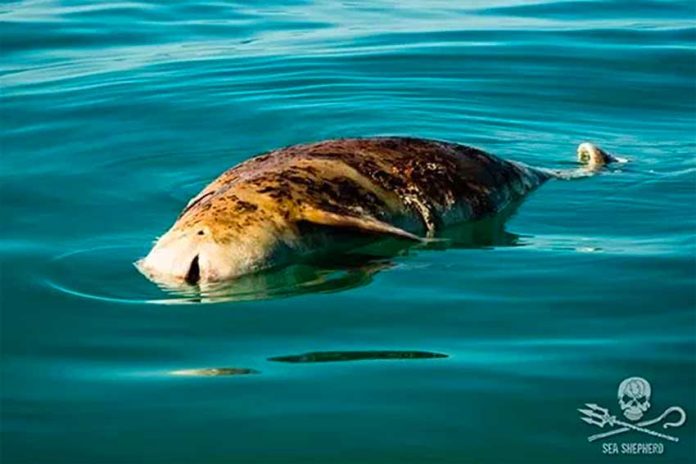Only 10 vaquita marina porpoises likely remain in the world, scientists announced today, but the number might actually be nine after the environmental group Sea Shepherd Conservation Society found the decomposed body of what appeared to be one of the highly endangered cetaceans.
The population estimate was made by scientists of the International Committee for the Recovery of the Vaquita (CIRVA), which also called on President López Obrador to end all gillnet fishing in the upper Gulf of California by adopting a “zero tolerance” policy on the practice.
The vaquitas often die after becoming trapped in gillnets that are used to catch shrimp and fish species such as totoaba, whose swim bladder is considered a delicacy in China and demands high prices.
“One of Earth’s most incredible creatures is about to be wiped off the planet forever,” said Sarah Uhlemann, international program director at the Center for Biological Diversity.
“Yet Mexico has only made paper promises to protect these porpoises from deadly nets, without enforcement on the water. Time is running out for President López Obrador to stop all gillnet fishing and save the vaquita.”
CIRVA said that the population of the species declined by 50% last year, leaving an estimate of around 10 remaining vaquitas although the number could be as high as 22 or as low as six.
The higher estimate was the number of vaquitas detected using a network of acoustic monitors last fall while the lower figure is the number that was actually seen by researchers.
“The few remaining vaquitas inhabit a very small area, approximately 24 by 12 kilometers, most of which lies within the vaquita refuge. However, high levels of illegal fishing for totoaba occur in this area,” the CIRVA report said.
“There is only the tiniest sliver of hope remaining for the vaquita,” said Kate O’Connell, a marine wildlife consultant with the Animal Welfare Institute.
“Mexico must act decisively to ensure that all gillnet fishing is brought to an end throughout the upper gulf. If the vaquita is not immediately protected from this deadly fishing gear, it will go extinct on President Lopez Obrador’s watch.”
Meanwhile, Sea Shepherd said today that two of its patrol boats found a net on Tuesday that contained what is believed to be the remains of a vaquita. They have been turned over to authorities for further study.
Sea Shepherd has been collaborating with security forces including the navy to carry out patrols to stop illegal fishing and to search for and remove gillnets.
But the organization’s vessels have come under attack in recent months and with the peak totoaba season approaching, some environmentalists fear that the vaquita could be wiped out as soon as this year.
CIRVA, however, believes that there is still hope for the species.
It said that recovery remains possible because the remaining vaquitas are healthy and still producing offspring.
Source: Associated Press (sp)
